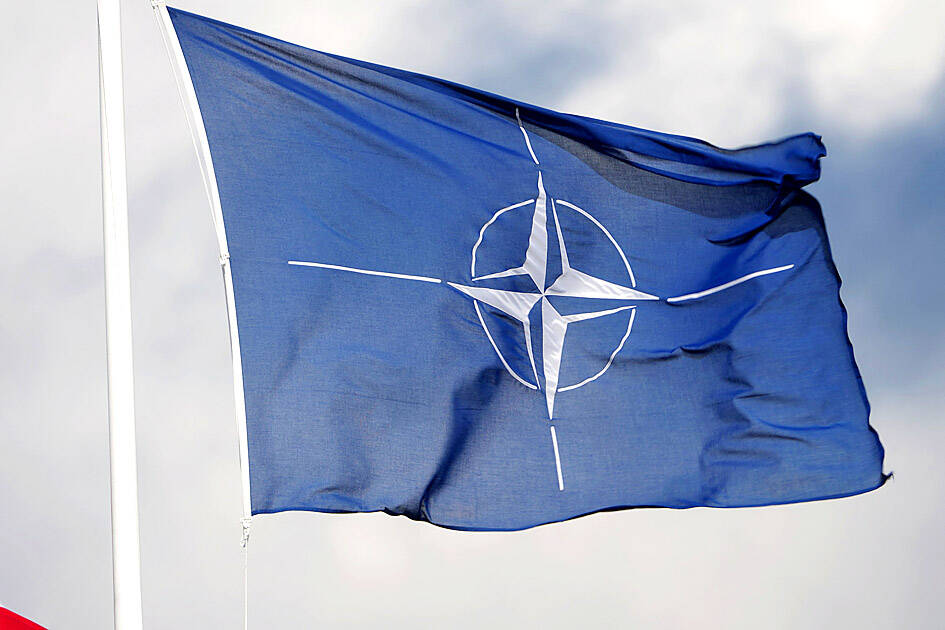NATO is reportedly planning to open a liaison office in Japan to coordinate with close partners across the Indo-Pacific region including Australia, South Korea and New Zealand.
The plans are likely to attract criticism from the Chinese government, which has previously warned the Western alliance against extending “its tentacles to the Asia-Pacific.”
Nikkei Asia yesterday reported that NATO and Japan plan to upgrade their cooperation on tackling cyberthreats, disinformation, and emerging and disruptive technologies.

Photo: Reuters
NATO’s planned new liaison office in Tokyo — to open next year — would be the first of its kind in Asia and would allow the military alliance to conduct periodic consultations with Japan and key partners, such as Australia, Nikkei Asia reported.
The move would be consistent with NATO’s increasing interest in developments in the Indo-Pacific. In its “strategic concept,” unveiled last year, NATO said that China posed “systemic challenges” to Euro-Atlantic security, even though Russia remained “the most significant and direct threat to allies’ security.”
NATO vowed to “strengthen dialogue and cooperation with new and existing partners in the Indo-Pacific to tackle cross-regional challenges and shared security interests.”
NATO accused China of carrying out “malicious hybrid and cyberoperations” and “remaining opaque about its strategy, intentions and military buildup.”
Australian Prime Minister Anthony Albanese has accepted an invitation to travel to the next NATO summit in Vilnius in July.
“Australia shares with NATO members a commitment to supporting democracy, peace and security, and upholding the rule of law,” a spokesperson for Albanese said last month.

A Chinese freighter that allegedly snapped an undersea cable linking Taiwan proper to Penghu County is suspected of being owned by a Chinese state-run company and had docked at the ports of Kaohsiung and Keelung for three months using different names. On Tuesday last week, the Togo-flagged freighter Hong Tai 58 (宏泰58號) and its Chinese crew were detained after the Taipei-Penghu No. 3 submarine cable was severed. When the Coast Guard Administration (CGA) first attempted to detain the ship on grounds of possible sabotage, its crew said the ship’s name was Hong Tai 168, although the Automatic Identification System (AIS)

An Akizuki-class destroyer last month made the first-ever solo transit of a Japan Maritime Self-Defense Force ship through the Taiwan Strait, Japanese government officials with knowledge of the matter said yesterday. The JS Akizuki carried out a north-to-south transit through the Taiwan Strait on Feb. 5 as it sailed to the South China Sea to participate in a joint exercise with US, Australian and Philippine forces that day. The Japanese destroyer JS Sazanami in September last year made the Japan Maritime Self-Defense Force’s first-ever transit through the Taiwan Strait, but it was joined by vessels from New Zealand and Australia,

CHANGE OF MIND: The Chinese crew at first showed a willingness to cooperate, but later regretted that when the ship arrived at the port and refused to enter Togolese Republic-registered Chinese freighter Hong Tai (宏泰號) and its crew have been detained on suspicion of deliberately damaging a submarine cable connecting Taiwan proper and Penghu County, the Coast Guard Administration said in a statement yesterday. The case would be subject to a “national security-level investigation” by the Tainan District Prosecutors’ Office, it added. The administration said that it had been monitoring the ship since 7:10pm on Saturday when it appeared to be loitering in waters about 6 nautical miles (11km) northwest of Tainan’s Chiang Chun Fishing Port, adding that the ship’s location was about 0.5 nautical miles north of the No.

SECURITY: The purpose for giving Hong Kong and Macau residents more lenient paths to permanent residency no longer applies due to China’s policies, a source said The government is considering removing an optional path to citizenship for residents from Hong Kong and Macau, and lengthening the terms for permanent residence eligibility, a source said yesterday. In a bid to prevent the Chinese Communist Party (CCP) from infiltrating Taiwan through immigration from Hong Kong and Macau, the government could amend immigration laws for residents of the territories who currently receive preferential treatment, an official familiar with the matter speaking on condition of anonymity said. The move was part of “national security-related legislative reform,” they added. Under the amendments, arrivals from the Chinese territories would have to reside in Taiwan for